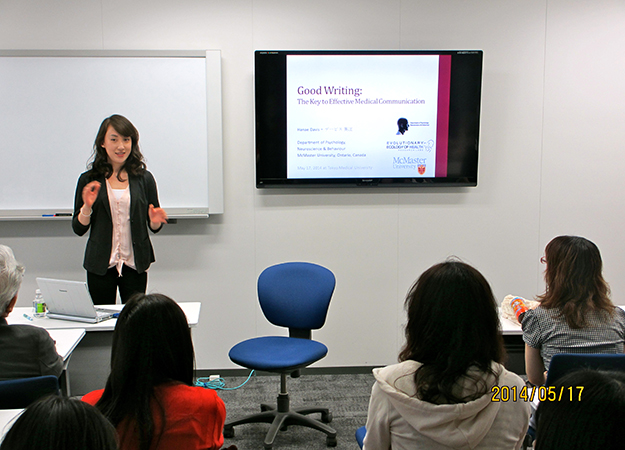Big in Japan: Mac student leads medical writing lecture in Tokyo

'The human element was the most challenging to teach, but also the most important to understand,' says Hanae Davis. The McMaster student gave a presentation at Tokyo Medical University earlier this year, with a focus on strong English medical writing.
Fourth-year student Hanae Davis recently travelled to Japan to lead a talk on proper English medical writing at Tokyo Medical University. Below is a first-hand account of how Davis prepared for the lecture, thanks to a little help from professor David Shore.
Writing well is a hard-earned skill, not an automatic endowment.
That’s one of the major themes of professor David Shore’s second-year scientific writing course in the Department of Psychology, Neuroscience & Behaviour.
Professor Shore uses the course (2XD3) to break down the writing process, and teaches students to parse an essay into paragraphs, paragraphs into sentences and sentences into words.
At each level, he encourages a methodical evaluation of word choice, flow and conciseness, with the goal of writing about complex scientific ideas with clarity and brevity — a task more difficult than you might think.
These are the same things I set out to communicate in a talk I gave on proper English medical writing at Tokyo Medical University in Japan this summer.
TMU’s International Medical Communications Center trains students whose second language is English in English writing, so they can submit their research to North American and European scientific journals.
I used what I learned in professor Shore’s course and modelled my talk around five key elements of good writing: writing structure, the lead (introductory) paragraph, conciseness, stylistic grammar and the human element.
The human element was the most challenging to teach, but also the most important to understand. In scientific writing, it’s easy for the author’s voice and personality to be lost in all the jargon, but academic writing can be well-expressed and approachable. In fact, both are needed to effectively reach your audience.
In my concluding remarks, I emphasized the core message from 2XD3: good writing is hard. Writing is rewriting, and it takes time and effort to produce something that, if you are dedicated, you are satisfied with.
After the talk, feedback was overwhelmingly positive. Most attendees knew about McMaster and were very interested in the concept of an undergraduate course that teaches students writing skills, and found the information helpful for their own research projects.
Research and ideas ought to be communicated effectively, and in Psychology, Neuroscience & Behaviour we are fortunate to receive training in how to better impart our ideas.
As an undergraduate student in the program, I thoroughly enjoyed informing an international audience of what our department offers to enlighten young minds in such a valuable and transferable skill.

